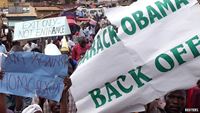American Christian zealots are fighting back against gay rights—abroad
IT MIGHT seem only a nasty coincidence. As gay rights advance in the West—France and New Zealand are the latest countries to legalise same-sex marriage—homophobia is on the rise elsewhere. But these apparently contradictory trends may be related. Confounded at home, a crusading squad of American conservative Christians are taking the fight abroad.
In an unusual case, brought under the Alien Tort Statute, a judge in Massachusetts is pondering a claim by Sexual Minorities Uganda (SMUG), a gay-rights group, against Scott Lively, a preacher and co-author of “The Pink Swastika” (which argues that Nazism was fuelled by homosexuality). Mr Lively visited Uganda in 2009, meeting politicians, appearing on television, and sharing his theories about homosexuals’ recruitment of youngsters.
Shortly afterwards a Ugandan MP introduced a parliamentary bill that would stiffen existing penalties for homosexual behaviour; among other drastic measures it mandated the death sentence for “aggravated” homosexuality. Amid a burst of anti-gay vitriol, and headlines such as “Hang Them, They Are After Our Kids”, a gay activist was murdered. SMUG alleges that, on this occasion and previously, Mr Lively conspired to persecute Ugandan homosexuals. He says he advocated therapy and prevention, not harsh punishments.
This episode is part of a wider campaign. Other preachers, such as Lou Engle, a fundamentalist pastor at a megachurch in Kansas, have also been to Uganda. A new documentary, “God Loves Uganda”, depicts co-ordination between the visitors, resident missionaries and American-trained Ugandan priests. Offshoots of the American Centre for Law and Justice (ACLJ), a group founded by the televangelist Pat Robertson, in Kenya and Zimbabwe, are said to have resisted gay-friendly changes to their constitutions. (The ACLJ insists it “does not export an agenda”.)
In Africa campaigners adopt the language of anti-colonialism, portraying gay rights, and even homosexuality itself, as Western impositions; opponents counter that the criminalisation of gay sex is itself largely a legacy of empire. But the rhetoric and tactics are flexible. The Americans are happy, when necessary, to co-operate with like-minded Roman Catholic and Orthodox believers, which barely count as Christian in the eyes of extreme Protestants. Hardline Islamists are tacit allies too.
In the former Soviet Union, where homosexuality has mostly been legalised, the emphasis is on preventing its “promotion”. Here, says Julie Dorf of the Council for Global Equality, a lobby group based in Washington, DC, American efforts are feeding prejudice and anti-gay legislation.
Two bills trundling through Ukraine’s parliament, for example, would criminalise gay “propaganda” (a similar bill is on the stocks in Russia’s Duma). To be sure, indigenous hostility (sometimes violent) towards homosexuality abounds. But Jim Mulcahy, a retired priest now ministering to gays in Ukraine, thinks the anti-gay lobby’s resources and multimedia techniques bespeak American involvement.
Both Paul Cameron, an American psychologist who likens homosexuality to drug use, and Mr Lively, have toured eastern Europe. Gay activists in Moldova say that outsiders’ influence helped to reduce the prominence of sexuality in a recent anti-discrimination law. In Latvia Mr Lively fraternised with a church whose members have harassed gay-pride marches.
A third front is the Caribbean and Central America. Caleb Orozco of UNIBAM, a gay-rights group in Belize, is arguing in court that its criminalisation of homosexual sex violates the constitution. According to Heidi Beirich of the Southern Poverty Law Centre, an American civil-rights watchdog, a coalition of churches resisting the move is supported by the Alliance Defending Freedom (ADF), another American outfit. (The ADF, like Mr Engle, could not be reached for comment.) Belize’s most prominent anti-gay cleric is American; his church is affiliated to a ministry in Arizona, whose leader has urged believers to raise the dead in morgues. Mr Orozco has been threatened and attacked with a bottle.
Collateral damage
The American fundamentalists see themselves as defending biblical values and stemming degeneracy. Abroad, the policies they advance in that cause are often more extreme than those they espouse at home (though Mr Lively would like to “re-criminalise adultery, fornication and homosexuality” in America, too, albeit as minor misdemeanours). Several would like to usher in a global theocracy.
In America exponents of such ideas are liable to be dismissed as cranks and bigots; for their part they regard their own country as morally lost. But on their travels abroad they receive a respectful hearing, addressing parliaments and appearing on mainstream television.
That sort of reception boosts morale, but can offer practical benefits, too. Influence, visibility and access, in countries where (as the faithful see it) righteousness remains unvanquished, all help with fund-raising. The activists often traverse the same circuit, in what could be seen as a kind of competition.
The arguments they deploy make the connection between the changes in the West and the pushback elsewhere explicit. Anti-discrimination laws and other liberalising reforms are evidence of a worldwide secular conspiracy, against which Africa, or eastern Europe, or the Caribbean must fortify themselves. Occasional rebukes by the American government about persecution of gays abroad only prove the conspiracy’s power. Some clues suggest that the itinerants’ real focus is elsewhere. Their sound and fury about issues such as gay marriage and adoption may resonate in America, yet have little relevance in countries where even private homosexual acts are illegal.
Kapya Kaoma, an Anglican priest from Zambia who works for Political Research Associates, a liberal think-tank in Boston, observes that the campaigners face a powerful progressive lobby at home, but in east Africa their adversaries are isolated and weak. The suffering of homosexuals in such places, he says, is “collateral damage” in America’s culture wars.
Source: The Economist
